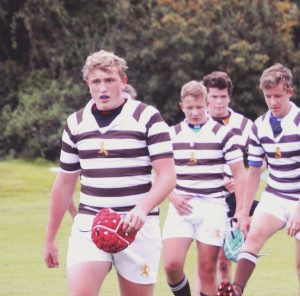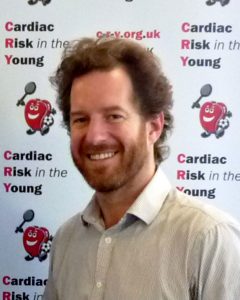Brave teenager posts inspiring blog about recent heart diagnosis and the changes he’s made to keep himself fit and fearless about the future
A teenager from Tenby has spoken publicly about a life-changing diagnosis that has seen him give up his sporting dreams on the advice of cardiologists who told him that his heart rate must never “hit 180 again”.
But rather than allow this news to stop him in his tracks, the 16-year-old pupil from Monmouth School has turned the diagnosis into an opportunity to take up new pursuits, including golf and photography, as well as “giving something back” by coaching young rugby players and campaigning about the importance of general population heart screening. A powerful post on the myheart pages of the charity Cardiac Risk in the Young’s (CRY) website is already providing huge hope to the increasing number of young people who are being identified through CRY’s UK-wide screening programme.

However, an anomaly was immediately picked up and, after several months of further rigourous testing Frank was eventually diagnosed with a condition known as Hypertrophic Cardiomyopathy (HCM) – a thickening of the heart muscle which (if left undiagnosed and untreated) can tragically lead to sudden cardiac death.
Frank, a talented rugby player, was told he’d never play intense, competitive sport again.
However, Frank’s incredible maturity and positive outlook on life has enabled him to come to terms with this professional verdict and accept that his life will now take a different path – as well as thanking the doctors who have allowed him to manage and live with his condition, rather than potentially die from it.
He says: “My whole life was based around sport and I grew up with intense sport being a huge part of my life. So, my diagnosis was a huge shock as I had totally expected a positive outcome. I told the squad, in the changing rooms, they would be losing a teammate…. and as they went on to win the game, the realisation sank in. That day will never leave my memory
“However, I – and my parents – would still 100% recommend that other young people get screened. It’s so important. And, you can live without sport if you fill your life with different things. In fact, I would go as far to say I’m now happily living with HCM, it’s just that life’s a bit different than I’d planned!”
Official figures, first published by CRY, show that every week in the UK around 12 young people (under the age of 35) die suddenly from a previously undiagnosed heart condition. 80% of these deaths will occur with no prior symptoms, which shows, like in Frank’s case, why screening is so important.
Sport itself does not actually cause sudden cardiac death but it can significantly increase a young person’s risk if they have an underlying condition. And, although screening won’t identify all young people at risk, in Italy, where screening is mandatory for all young people engaged in organised sport, they have reduced the incidence of young sudden cardiac death by 90%.

“Frank’s story is becoming more and more common as we test increasing numbers of young people – with apparently no symptoms, no obvious family history or warning signs. However, Frank’s attitude is amazing and we really do applaud him for speaking out and blogging about his experience. Not only will this encourage an even greater uptake of screening but will also reassure other, recently diagnosed young people that this does not mean the end of your life, rather the start of a new path – something I can say too, from experience!”
He adds; “Frank and his family are now in good hands and will undergo check ups and genetic testing to ascertain who else in might be at risk – either now or in future generations. However, it is important to point out that this type of “cascade” genetic testing, which is much talked about in the news right now, only usually takes place in the aftermath of a devastating and tragic death – and that’s just not good enough.
“What Frank’s story has shown us is the importance of screening for young people who don’t know of any family history and preventing problems before it’s too late.”
CRY’s hugely subsidised screening programme is overseen by Professor Sanjay Sharma, Professor of Inherited Cardiovascular Disease and Sports Cardiology at St George’s Hospital London and the Medical Director of the Virgin London Marathon -and feeds directly into a world-leading research programme, also under Professor Sharma’s supervision.
Frank concludes: “I truly believe you need to think of what you can do rather than what you can’t do. I never would have taken up photography, golf or music if it wasn’t for this diagnosis and I may have ended up in hospital with injuries if I was to continue my love for rugby. So at least my mother is now happy! I’m still immersed in the world of rugby and triathlon by watching it on TV and attending supporting events and games in person. So, it’s not really goodbye after all.”
Anyone wishing to book into a free, CRY screening can do so in 3 clicks @ www.testmyheart.org.uk
Read Frank’s full blog here.
A screening will also be taking place at Ysgol Dyffryn Taf in Carmarthen on 19th and 20th August (funded by the Dean Mason Memorial Fund) – the same venue where Frank was originally identified. Currently, some places are still available.






